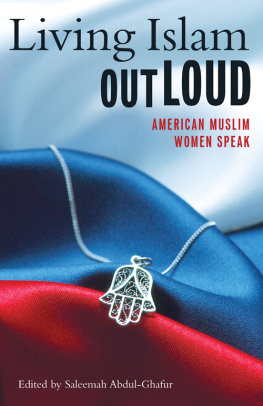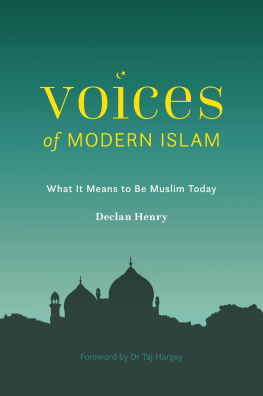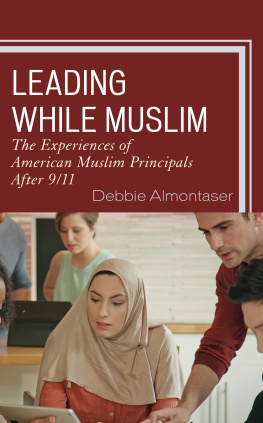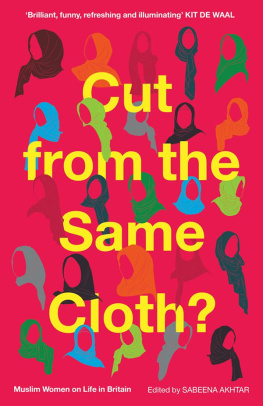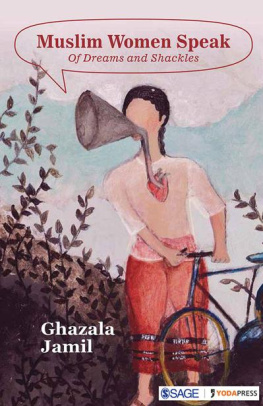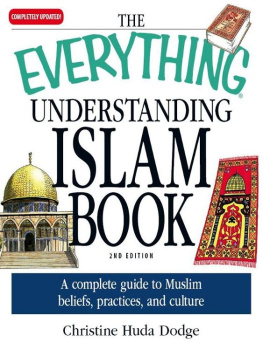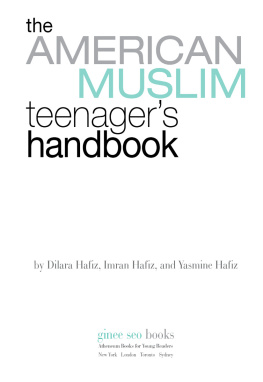
IN MEMORY OF
Sharifa Al Khateeb
FOR
Kaylah and Kai
INTRODUCTION
This anthology is about women who dont remember a time when they werent both American and Muslim. We are the children of immigrants from Pakistan, Egypt, and Senegal. We are the distant descendants of African slaves brought to the Americas as well as the children of American men and women who accepted Islam in adulthood. Unlike us, our parents were raised largely in other countries or in other faith traditions. Our education was a colorful mix of home schooling, the local mosque, and Public School #9. We wore Underoos and watched MTV. We know juz amma (the final thirtieth of the Quran) and Michael Jacksons Thriller by heart. We played Atari and Game Boy and competed in Quranic recitation competitions. As we enter our twenties, thirties, and forties we have settled into the American Muslim identity that weve pioneered.
Some of us were told that there was no need to craft an American Muslim identitythat we could simply apply the Quran and the sunnah (traditions of the Prophet Muhammad) to our lives. That is simplistic and unrealistic. For example, I do not observe the rules of mahram (requiring a lone female to travel with a male guardian). Nor can I imagine marrying the way the contemporaries of the Prophet Muhammad married (many women during the time of the Prophet married for political and business reasons, with none of the modern notions of love and marriage). In addition, much of the Islam we American Muslim women know was defined and interpreted abroad, in the larger Muslim world. It is Islam fused with foreign culture. Thats why Muslim women in Senegal dress differently from Muslim women in Moroccoeach culture has its own interpretation, and we in the United States are creating a distinctly American Muslim culture. American Muslim women are choosing a path that honors our Islamic faith and our American heritage without apology.
The paradox of September 11, 2001, is that it firmly and forever established Islam and Muslims in the eyes of the West. Muslims have been in the West for centuries, and in ever-increasing numbers since the mid-twentieth century, but the tragic events of 9/11 created an unparalleled awareness of our presence. The result is that Islam has gone mainstream, and it is suddenly clear just how profoundly ignorant Americans have been about Islam and Muslims. Go home... back where you came from! passersby yelled at my friends. I laughed when I heard these stories, because I thought, Just where would that be? My family has been in the United States for centuries. My parents accepted Islam in their twenties and I was raised as a Muslim in northern New Jersey. Home for me is New Jersey and I have never felt as though I wasnt American. At the same time, I was saddened because I understood that for many Americans, Islam and Muslims had an alien facea face that resided outside of the normative human family and relegated us to perpetual otherness.
While there are 1.2 billion Muslims worldwide, U.S. Census data and a recent study by Cornell University place the American Muslim population at around 7 million. Islam is the fastest growing religion in the world, and in the United States, the American Muslim population has exploded almost overnight. In the United States, Muslims are fairly spread out, with major cities hosting the highest concentration. The American Muslim population encompasses eighty different nationalities, with African Americans being the largest single ethnic group; of the remainder, about a third are of South Asian descent and another third of Middle Eastern or North African descent. American Muslims range in the way we practice Islam and in our affiliation with any particular Muslim community. I have yet to find data detailing the exact number of American Muslim women; that said, what is significant about the American Muslim population is that the data demonstrate that American Muslims are younger, more educated, and more affluent than the average American.
There are many misconceptions about Islam and Muslims, including the notion that all Muslims are recent immigrants and that all African American Muslims are from the Nation of Islam or became Muslim in prison. Various interpretations of the role of Muslim women in sacred Islamic texts and in contemporary society give rise to the biggest misconceptions of allthat we are oppressed, relegated to secondary status, and often placed on a pedestal similar to the suppressed women of the Victorian era. Very rarely do we encounter empowering images of American Muslim women.
The truth is that some Muslim women, both in the United States and abroad, are in fact oppressed in many ways and do not live self-determined lives. The truth is also that many Muslim women live powerful lives sourced from the freedom granted to us by God. No longer can mainstream institutions and individuals continue to paint Islam with the broad brush of rigidity, chauvinism, and antiquated notions. At the same time, more Muslims are acknowledging what ails our communities so that we can step into an egalitarian and humanistic future. God speaks to us in the Quran saying that He will not change our condition until we change what is in our hearts and souls.
I believe that Islam is in the midst of global transformation. This transformation is being led largely by Muslims in the West because we have certain academic freedoms along with freedom of speech and freedom to worship. These civil liberties are largely unknown in Muslim-majority countries. Those of us leading this transformation are confident in claiming Islam for ourselves. We recognize the problems within the Muslim community even as we critique the mainstreams rush to stereotype us. Now more than ever, the world needs to hear our voices.
Most of the books written about Islam and Muslims that are widely accessible to the mainstream are by people of other faith traditions. And many of the books written by American Muslims are about immigrants coping with assimilation, or else they offer conversion stories about why the grass is greener on the Muslim side. This book is about the first true generation of American Muslim women. That is, for the first time in history we have a critical mass of women under forty years old, raised as Muslims in the United States by parents who themselves struggled to reconcile their American and Muslim identities. We have never lived without Islam, nor did we grow up in Muslim-majority countries.
Over the past three years, I traveled around the nation and listened to the issues facing American Muslim women, which I have grouped as follows: intersecting identities, hijab, relationships, culture juxtaposed to Islam, sex and sexuality, activism, and spirituality. The essays in this anthology examine these issues through first-person accounts. Though it was not part of the plan, each contributor ended up discussing two of these issues no matter what else her piece was about: the juxtaposition of culture and Islam in general, and the question of hijab in particular. All of us have inherited cultural norms, which are embedded in our practice of Islam; no place is this more evident than in America, where there are so many ethnicities and nationalities represented among Muslims. Each culture comes with its own interpretation and manifestation of Islam. Similarly, each of the essays in this collection has a thread describing how ethnic culture is manifested in each authors practice of Islam and how our ethnic identity can supersede spirituality. In addition, each of us is individually creating an American Muslim identity, which in the aggregate form the beginnings of American Muslim culture.

